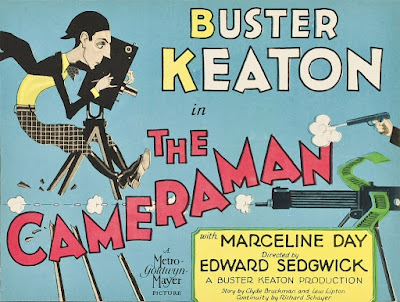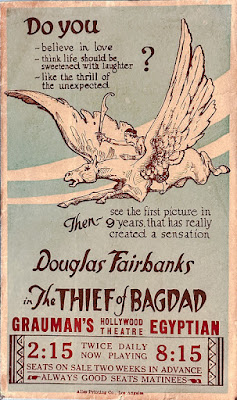Timing is everything!
Consider: I've developed a case of severe tendonitis in my right arm just as I'm starting a one-month hiatus from silent film accompaniment.
Hope that gives the arm time to heal and get back to normal by the time I resume in July.
First film then will be Keaton's 'The Cameraman' (1928), which I'll accompany on Saturday, July 20 at Brandon (Vt.) Town Hall.
For now, thank you to all who attended screenings during the first half of 2024. Looking forward to 'Part 2' when I get back on the accompaniment circuit.
For now, here's a preview of 'The Cameraman.' Hope to see you there!
* * *
MONDAY, JUNE 10, 2024 / FOR IMMEDIATE RELEASE
For more info, contact: Jeff Rapsis • (603) 236-9237 • jeffrapsis@gmail.com
'The Cameraman' with live music on Saturday, July 20 at Brandon Town Hall
Buster Keaton's classic silent comedy set in 1920s New York City to be shown on the big screen
BRANDON, Vt.—He never smiled on camera, earning him the nickname of "the Great
Stone Face." But Buster Keaton's comedies rocked Hollywood's silent era
with laughter throughout the 1920s.
See for yourself with a
screening of 'The Cameraman' (1928) one of Keaton's landmark feature
films, on Saturday, July 20 at 7 p.m.
at the Brandon Town Hall and Community Center.
All are welcome to this family-friendly event. Admission is free,
with free will donations accepted in support of ongoing Town Hall
renovations.
The
screening, the latest in the venue's silent film series, will feature
live accompaniment by Jeff Rapsis, a New Hampshire-based composer who
specializes in creating music for silent films.
'The
Cameraman' tells the story of a young man (Keaton) who tries to impress
the girl of his dreams (Marceline Day) by working as a freelance
newsreel cameraman.
His efforts fail spectacularly, but then a
lucky break gives him an unexpected chance to make his mark. Can Buster
parlay the scoop of the year into a secure job and successful romance?
In 'The Cameraman,' Keaton uses the movie business itself to create comedy that plays with the nature of film and reality.
"Keaton's films are audience favorites, and people continue to be surprised at how engrossing and exhilarating they can be when shown as they were intended: in a theater, and with live music," said accompanist Jeff Rapsis, who performs at more than 100 screenings each year at venues around the nation and abroad.
Rapsis, who lives in Bedford, N.H., improvises live scores for silent films using a digital synthesizer to recreate the texture of the full orchestra.
"It's kind of a high wire act," Rapsis said. "But for me, the energy of live performance is an essential part of the silent film experience."
The screening of 'The Cameraman' is sponsored by Donna Malewicki; Barbara and Tom White; and Gary and Nancy Meffe.
Other films in this year's Brandon Town Hall silent film series include:
• Saturday, Aug. 10, 2024, 7 p.m.: "Four Horsemen of the Apocalypse"
(1921) starring Rudolph Valentino. Sweeping drama of a divided family with
members caught up on oppositessides during World War I. Breakthrough film for Rudolph Valentino,
introducing the sultry tango and launching him to stardom. The real
deal! Shown both in honor of the 110th anniversary of World War I's
outbreak and the anniversary of Valentino's untimely death in 1926.
• Saturday, Sept. 21, 2024, 7 p.m.: "Speedy" (1928)
starring Harold Lloyd. Harold's final silent feature cis a
tribute to New York City, baseball,
and the idea that nice guys can indeed finish first, highlighted by one
of the most exciting races to the finish in all silent cinema. Complete
with an
extended cameo from none other than Babe Ruth!
• Saturday, Oct. 19, 2024, 7 p.m.: "Phantom of the Opera" (1925) starring Lon Chaney. Long before Andrew Lloyd Webber created the hit stage musical, this
silent film adaptation starring Lon Chaney put 'Phantom' firmly
in the pantheon of both horror and romance. Just in time for Halloween!
• Saturday, Nov. 16, 2024, 7 p.m.: "Barbed Wire" (1927) starring Pola Negri, Clive Brook. During World War I, the French government commandeers a family farm for
use as a camp for German POWs, setting the local population at each
other. Intense drama about forbidden love and the human condition, with a
special holiday twist.
See Buster Keaton in the 'The Cameraman' (1928) with live music on Saturday, July 20 at 7 p.m. at the Brandon Town Hall and Community Center, Route 7, in Brandon, Vt. Admission is free, with free will donations accepted in support of ongoing Town Hall renovations.For information, visit www.brandontownhall.com.








































